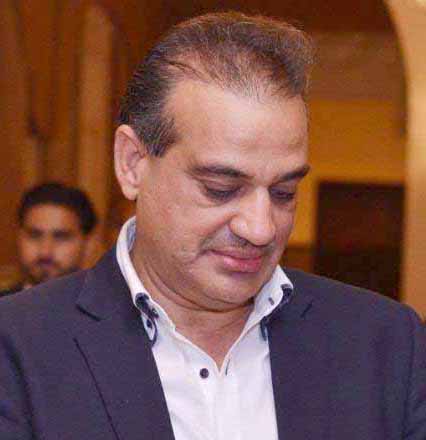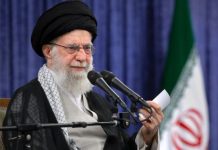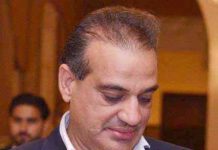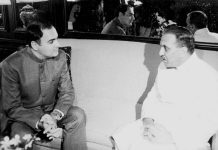To withstand the influence of the Establishment demands exceptional courage and remarkable efficiency from the PML-N administrations, both in Punjab and on the federal stage. Given the current context, this endeavor seems akin to a Herculean feat, suggesting that neither Nawaz’s return to power nor the containment of the Establishment’s influence will come easily
Analysis
Ansar M Bhatti
In a surprise move Foreign Minister Ishaq Dar has been elevated as the Deputy Prime Minister of Pakistan – a move that seeks to relieve Prime Minister Shehbaz Sharif of some of his administrative responsibilities or burden whatever we may call it. However, beyond mere delegation, Dar’s elevation holds deeper implications. It is poised to reinforce Nawaz Sharif’s influence over governmental affairs significantly.
With Dar assuming the role of deputy prime minister, Nawaz Sharif, who is anticipated to assume the presidency of the party, gains a pivotal channel to advocate his vision and objectives. This move strategically situates him to garner the trust and backing of the party’s supporters and stakeholders. Nawaz Sharif’s intervention couldn’t have come at a more critical juncture. The party was teetering on the brink of disarray, plagued by lackluster performance and internal discord, which threatened its very existence in the political arena.
After this significant appointment, particularly the dynamics of civil-military relations may undergo a shift, seemingly unfavorable for the PML-N. Having been marginalized, Nawaz Sharif appeared determined to regain influence within the prime minister’s domain. The underlying motive, it seems, was to rectify the perceived ‘insult’ inflicted upon him by his exclusion from the prime minister’s office. By orchestrating the appointment of Ishaq Dar as the deputy prime minister, he may have sought to settle certain scores. However, political analysts caution that the potential ramifications of this maneuver could be substantial.
Ishaq Dar, a prominent figure within the PML-N, harbored aspirations to serve as the finance minister, a position of significant influence within the government. However, his ambitions were thwarted by opposition from international financial institutions, complicating his path to securing the portfolio. Additionally, strained relations with the Establishment further hindered his prospects, ultimately leading to his departure from the finance ministry.
The subsequent appointment of Mohsin Naqvi as Interior Minister brought further challenges for the PML-N, adding to the perception of instability within key ministerial positions. Given the pivotal role that both the finance and interior ministries play in governmental performance, Shehbaz Sharif’s leadership was perceived as compromised due to his lack of control over these crucial portfolios.
Recognizing the need to address this power imbalance, the appointment of Ishaq Dar was intended to restore equilibrium within the government. Moreover, under this arrangement, there was a potential for the finance and interior ministers to fall under the supervision of the deputy prime minister, further solidifying the government’s operational structure.
The PML-N finds itself in a challenging position due to its close ties with the Establishment. The perception that the party ascended to power through these connections has dealt a significant blow to its credibility. The leadership, especially the Nawaz faction, is keen to shed this perceived “stigma” to prevent the party from facing extinction. The appointment of the deputy prime minister seems to be a step in this direction.
Nevertheless, should the party aspire to rejuvenate its dwindling popularity, it must take decisive action. This entails fulfilling the pledges made to its electorate during the campaign period. Presently, the plight of the common citizenry persists, with challenges such as escalating electricity and fuel costs at the forefront. Additionally, inflation looms as another formidable adversary, exacerbating the burdens faced by the populace. Addressing these pressing issues necessitates not only political stability but also economic stability; for without the former, the latter remains an elusive goal.
The imminent IMF tranche is on the horizon, and Saudi investments could potentially bolster Pakistan’s economic landscape. However, the specifics of Saudi interest remain ambiguous. While the government has proposed stakes in sectors like PIA and hospitality, clarity on Saudi preferences is lacking. Recent interactions with the Saudi foreign minister failed to elucidate their investment focus, indicating Saudi Arabia’s indecision.
Concerns loom regarding Pakistan’s law and order and legal framework, posing potential barriers to attracting not only Saudi but other foreign investments as well. Saudi Arabia prioritizes a stable political environment where all stakeholders, including PTI, are aligned. This stance wasn’t well-received by certain quarters, evidenced by PTI member Sher Afzal Marwat’s allegations of Saudi interference in toppling the Imran Khan government. Marwat’s statement aimed to sour Saudi-PTI relations but appears to have had limited impact. Marwat’s actions suggest he may be trying to hedge his bets by playing both sides or perhaps that is what most of PTI leaders think about him.
The PML-N, under the leadership of Nawaz Sharif, has long been characterized by its contentious relationship with the Establishment. So, it’s hardly shocking that the party continues to follow this familiar trajectory. What’s truly captivating, though, is how the conflict has reared its head sooner than expected.
To withstand the influence of the Establishment demands exceptional courage and remarkable efficiency from the PML-N administrations, both in Punjab and on the federal stage. Given the current context, this endeavor seems akin to a Herculean feat, suggesting that neither Nawaz’s return to power nor the containment of the Establishment’s influence will come easily.

















